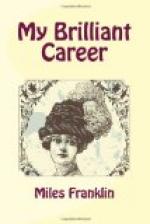Our greatest heart-treasure is a knowledge that there is in creation an individual to whom our existence is necessary—some one who is part of our life as we are part of theirs, some one in whose life we feel assured our death would leave a gap for a day or two. And who can be this but a husband or wife? Our parents have other children and themselves, our brothers and sisters marry and have lives apart, so with our friends; but one’s husband would be different. And I had thrown behind me this chance; but in the days that followed I knew that I had acted wisely.
Gertie’s letters would contain: “Harold Beecham, he makes me call him Harry, took me to Five-Bob last week, and it was lovely fun.”
Again it would be: “Harry says I am the prettiest little girl ever was, Caddagat or anywhere else, and he gave me such a lovely bracelet. I wish you could see it.”
Or this:
We all went to church yesterday. Harry rode with me. There is to be a very swell ball at Wyambeet next month, and Harry says I am to keep nearly all my dances for him. Frank Hawden sailed for England last week. We have a new jackeroo. He is better-looking than Frank, but I don’t like him as well.
Grannie’s and aunt Helen’s letters to my mother corroborated these admissions. Grannie wrote:
Harry Beecham seems to be very much struck with Gertie. I think it would be a good thing, as he is immensely rich, and a very steady young fellow into the bargain. They say no woman could live with him on account of his temper; but he has always been a favourite of mine, and we cannot expect a man without some faults.
Aunt Helen remarked:
Don’t he surprised if you have young Beecham down there presently on an “asking papa” excursion. He spends a great deal of time here, and has been inquiring the best route to Possum Gully. Do you remember him? I don’t think he was here in your day. He is an estimable and likeable young fellow, and I think will make a good husband apart from his wealth. He and Gertie present a marked contrast.
Sometimes on reading this kind of thing I would wax rather bitter. Love, I said, was not a lasting thing; but knowledge told me that it was for those of beauty and winsome ways, and not for me. I was ever to be a lonely-hearted waif from end to end of the world of love—an alien among my own kin.
But there were other things to worry me. Horace had left the family roof. He averred he was “full up of life under the old man’s rule. It was too slow and messed up.” His uncle, George Melvyn, his father’s eldest brother, who had so often and so kindly set us up with cows, had offered to take him, and his father had consented to let him go. George Melvyn had a large station outback, a large sheep-shearing machine, and other improvements. Thence, strong in the hope of sixteen years, Horace set out on horseback one springless spring morning ere the sun had risen, with all his




